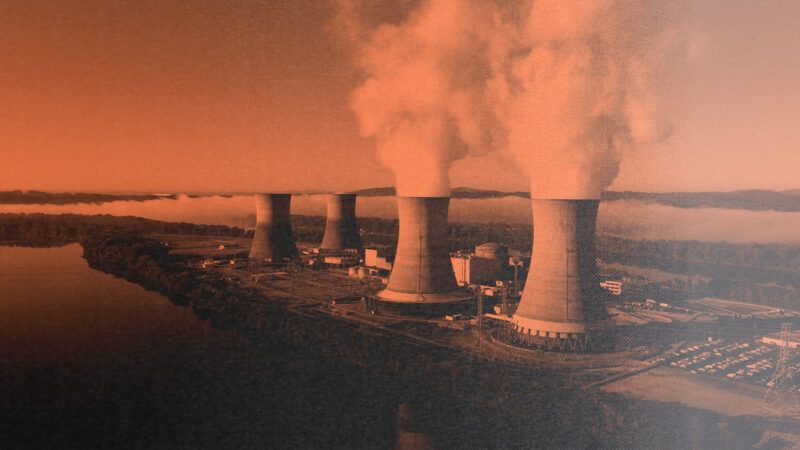Three Mile Island Can Restart Without Subsidies. The Federal Government Is Giving It $1 Billion Anyway.
Bringing the defunct power plant back online is a good thing. The government's involvement is not.

The site of America's most notorious nuclear energy incident will soon provide electricity to power Big Tech's AI ambitions. On Tuesday, the Energy Department announced that it will loan the Crane Clean Energy Center, formerly known as Three Mile Island (TMI) Nuclear Generating Station, $1 billion to restart operations of the power plant in Middletown, Pennsylvania.
Kickstarting America's nuclear energy sector has been a priority of the Trump administration and Energy Secretary Chris Wright. In May, President Donald Trump signed a series of executive orders to galvanize the industry, and Wright, who has targeted wasteful spending and slashed billions of dollars of Joe Biden-era green energy projects, has remained bullish about the need for the federal government to support nuclear power.
TMI is the home of America's sole nuclear energy accident. In 1979, TMI Unit 2 suffered a partial meltdown after a malfunction of its cooling mechanism. Even though the incident didn't cause any deaths or demonstrable health effects, it stoked fears about nuclear energy in the U.S. and contributed to the decline of America's nuclear power sector. The Pennsylvania legislature voted to close TMI's remaining reactor in 2019.
In 2024, Constellation Energy announced that it would reopen the site to provide power to Microsoft data centers under a 20-year power purchase agreement. TMI is expected to begin generating power again by 2027.
The Energy Department's $1 billion loan to Constellation will cover "the majority to [sic] the project's estimated cost of $1.6 billion," CNBC reported. Constellation, which operates the nation's largest fleet of nuclear energy, will receive the first installment of the loan in the first quarter of 2026.
At its face, the $1 billion loan is one of Trump's less egregious uses of public dollars for the energy sector; only weeks ago, he agreed to pump $80 billion into the build-out of Westinghouse Electric Company nuclear reactors in exchange for a possible equity stake in the company. But any instance of the federal government subsidizing an energy project, especially with the public holding over $30 trillion in debt, is a poor use of resources.
The timing of this loan makes the investment all the more questionable. As CNBC reports, "When asked why Constellation was receiving the loan now," an Energy Department official said, "Constellation could have completed the project without help from the Energy Department. But the loan will help make electricity cheaper for consumers on the grid operated by PJM Interconnection, which serves more than 65 million people across 13 states."
Wanting to reduce electricity rates may be a worthwhile goal—energy costs are outpacing inflation and are rising faster in some states with a higher concentration of data centers—but pouring public money into restarting nuclear power plants is not the best way to achieve this. After all, reckless spending is what has caused inflation to climb in recent years, and the government's bureaucratic and burdensome permitting system has made it harder and more expensive to build the energy infrastructure that can alleviate energy prices. Trump's trade war, meanwhile, is also likely to add to Americans' utility costs.
Unfortunately for ratepayers, the federal government does not seem ready to reduce its role in energy markets. The Trump administration has directed millions of dollars toward coal projects, axed renewable energy production, and taken an equity stake in a lithium mining company. It has also continued financing the restart of a decommissioned nuclear power plant in Michigan that received funding under the Biden administration, and, as CNBC reports, it might subsidize another nuclear restart in Iowa.
The restart of TMI and nuclear power's growing popularity could signal that the U.S. is ready for another buildout of the energy source. While this is good news for America's economy and environment, the Energy Department's recent funding announcement seems to indicate that this new era will be accompanied by the same unnecessary government intervention that has plagued the energy sector for decades.
